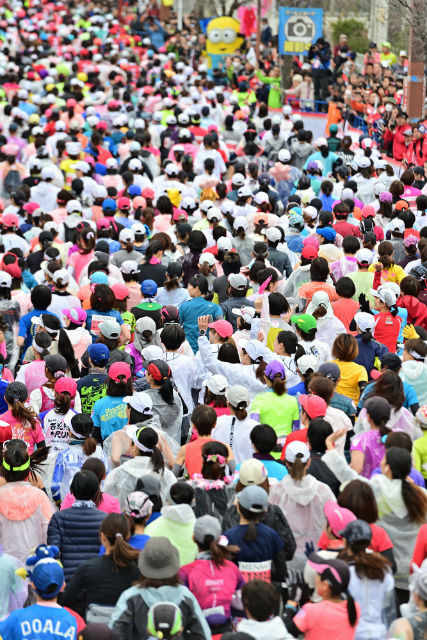When you run a Marathon, your body is put under tremendous physiological stress.
So as a result, this creates bodily changes that include the rising of your body temperature, your heart pumping harder and your muscles producing more waste from the prolonged period of exertion.

And these changes to the various parts of your body, will affect you in the following ways.
1) Legs
Says Dr. Ganesan Naidu, Specialist in Orthopaedic Surgery & Consultation, Raffles Orthopaedics Center, “Your knees and joints bear the brunt of shock from your feet pounding repeatedly on hard surfaces. Wearing the wrong running shoes worsens this, since there is nothing cushioning your joints from the shock.”
So as a result, you may get pain in your hip, knee and feet areas after the Marathon. Sometimes this pain may also extend to shins and feet as well the pelvis and if you are not careful, this can lead to stress fractures.
2) Heart
While Marathon runners show signs of heart damage in the immediate aftermath of their race, their hearts usually returned to normal within a few days.
If you run Marathons very frequently though, then your body may take longer to bounce back due to the continuous stress.
Says Dr. Derek Li, Family Physician, Raffles Medical Group, “A study by Mayo Clinic (in the USA) suggests that heart damage caused by frequent marathons can add up over time. Long term effects include premature heart ageing, arterial plaque build-ups and irregular heart-beat.”

Dr Derek Li.
Photo courtesy of Raffles Medical Group.
3) Immune System
It is common for Marathon runners to fall sick after their race. What is the reason for this?
Said Dr. Li, “Long endurance activities such as Marathons trigger your body to produce a large amount of the stress hormone, cortisol. This hormone suppresses your immune system, leaving you vulnerable to infections and sickness.”
4) Kidneys
To filter out the additional waste products that the body produces from a Marathon, your Kidneys have to work harder. As well, they have less resources such as water and oxygen to function, causing them to become temporarily damaged. But this damage is usually reversed within a few days, though.
How To Prepare Well For A Marathon
But despite this, you should not be put off from running a Marathon.

According to specialists from the Raffles Medical Group, having adequate preparation will bring you across the finish line safely.
Besides having a sound training plan – such as the training plan from Coached that I always follow – these five tips will also help to keep you safe and in one piece during and after your Marathon.
Get A Medical Check-Up
Even if you feel healthy, having a medical check up by a certified specialist prior to the Marathon will identify any medical conditions that may occur and you will be better equipped to reduce these.
As well, you can also improve your training programme with such advice – for example, if you are anaemic, you can increase your intake of iron-rich foods.
Buy Proper Running Shoes
When your shoes feel worn out, you should replace them immediately. This is because with prolonged use, the midsole foam in your shoes will break down, causing them to become stiffer over time. So your feet will get less cushioning and this increases your risk of injury.

Credit: Race Time Sports
If you are not sure what shoes to get, most specialty stores across Singapore will have trained staff who can look at your running gait and recommend shoes that are suited to you.
Your Nutrition
Your nutrition and diet plays a large role in how well you are able to train and recover from your training sessions.
According to the team from Raffles Medical Group, you need the following nutrients.
- Iron – Found in red meat, spinach and iron-fortified cereals, and helps in red blood cell production.
- Magnesium, Selenium and Zinc – Found in nuts and seeds, oysters, green vegetables and grains. Decreases risk of cramps and fatigue, improves immunity and promotes cellular repair.
- Potassium and Sodium – Found in bananas, beans and isotonic. Improves water retention.
- Vitamin D – Found in eggs and oily fish. Reduces your risk of bone fractures.
- Calcium – Found in spinach and milk. Reduces risk of bone fractures.
- Vitamins C and E – Found in nuts, sunflower seeds and a range of fruits and veggies. Strengthens your immune system and helps your body combat against free radicals.
Besides these nutrients, you should also make sure that your diet contains some carbohydrates, proteins and fluids to regain what you have lost from exercise.
Rest
Make sure that you take rest days to allow your body to repair itself from the rigour of Marathon Training. Lack of sleep can cause the cortisol levels of your body to rise, hampering its ability to recover.
Said Dr. Li, “Resting helps your body heal and adapt itself to the training that it has been through. You will not only approach your next training session feeling fresh but may also experience a boost in fitness and performance too.”
You can find the original article at https://www.raffleshealth.com.
The original article was put together by the Raffles Medical Group Team and was reviewed by Dr. Derek Li prior to posting.

Leave a Comment